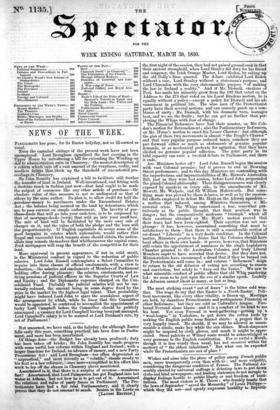Not unearned, we have said, is the holvday ; for
although Easter falls early this year, something practicer has been done in Parlia- ment, and more has been ascertained. Of things done—the Budget has already been produced ; duty has been taken off bricks ; Sir John Romilly has made progress with some useful law reforms within England and Ireland ; with a larger franchise for Ireland, an advance of money, and a new Party Processions Act : and Lord Brougham—too often depreciated as " unpractical," and most recently as " volatile," stands steady to his text as a law reformer,—once more exemplified in his effort this week to lop off the abuses in Chancery above mentioned. Ascertained is it, that there is a surplus of revenue—wondrous fact ! Ascertained, that Lord Palmerston has got England into hot water at Athens, but not how he is to get out of it. Ascertained the relations and value of party forces in Parliament. The Pro- tectionists have had a fair trial Parliamentary, and it clearly proves that they do not amount to much. Beaten in the Lords on
the first night of the session, they had not gained ground even in that their ancient stronghold, when Lord Stanley did duty for his friend and congener, the Irish Orange Master, Lord Roden, by raking up the old Dolly's Brae quarrel. The debate exhibited Lord Roden without a case, Lord Stanley without a statesman's purpose, and Lord Clarendon with the very statesmanlike purpose " of making the law in Ireland a reality." And if Mr. Disraeli, emulous of Peel, has made his minority grow from the 192 that voted on the Address to the 273 that voted on his Local Burdens motion, he is equally without a .policy--except a policy for Disraeli and his ad- vancement in .political life. The wise men of the Protectionist party have their several notions, and can scarcely patch up a sem- blance of unity : Mr. Disraeli, with his dramatic turn, manages best, and we see the fruits ; but he can get no further than per- plexing the Whigs with fear of change. The Financial Reformers have had their muster, on Mr. Cob- den's motion for Retrenchment; also the Parliamentary Reformers, on Mr. Thime's motion to enact his Lesser Charter : -but although the gist of these tire movements is almost " the People's Charter " and that very popular purpose reduced taxes, somehow they are put forward either so much as abatements of genuine popular demands, or as mechanical pretexts for aetation, that they have elicited no genuine popular adhesion. The joint party in its bifid capacity can raise a twofold debate in Parliament, and there it ends.- Are Ministers better off P Lord John Russell began the session with vast Colonial promise ; but it proves to end. in Downing Street performance, and to this day Ministers are contending with the imperfections and impracticabilities of Mr. Hawes's Australian Bill, just as they were last session, before Lord John propounded the grand Colonial philosophy. Their disingenuousness was clearly exposed by speakers on every side, in the amendments of Mr. Mowatt, Mr. Walpole, and Sir William Molesworth. -But some- thing more was proved by those debates, as well as by the success- ful efforts employed to defeat Mr. Hutt on the African squadron— a motion that induced, among Ministers themselves, a Mi- nisterial crisis. The Whigs entertained a fear, somewhat gra- tuitously as the public thought, that their position was in danger; but the comparatively moderate " triumph " which all their exertions obtained. on Mr. Hutt's motion proved that their fears had been keen-sighted. Their exertion was not sur- plusage : it has, however, ascertained something that must be satisfactory to them—that there is still a considerable section of soi-disant Liberals " in a very docile condition. In the Colonial matter, Ministers profess to desire that the Colonies should have local affairs in their own hands : it proves, however, that Ministers still retain the appointment of nominees in the single Legislative Chamber granted to the Australian Colonies, and truly Liberal Members ought to have resented that device. But they dare not. Ministerialists have encouraged a dread that if they be turned out the Protectionists will come in ; and veteran " Reformers" deign to return to the old delusion of voting not according to reason and conviction, but solely to " keep out the Tories." We saw to what miserable conduct of public affairs that old Whig pandering led : we seem to be just upon the eve of a similar epoch. Luckily the delusion cannot cheat so many, or last so long.


























